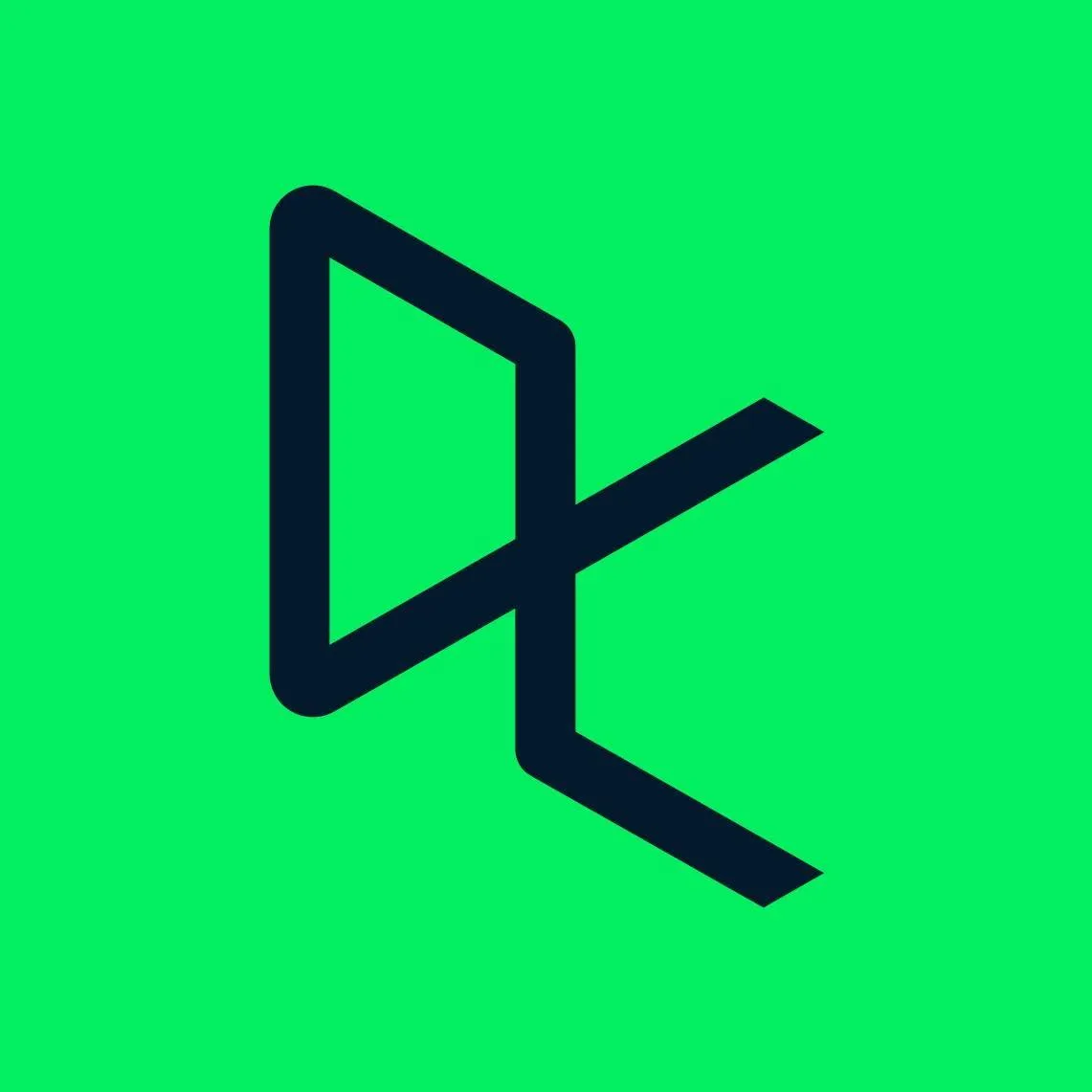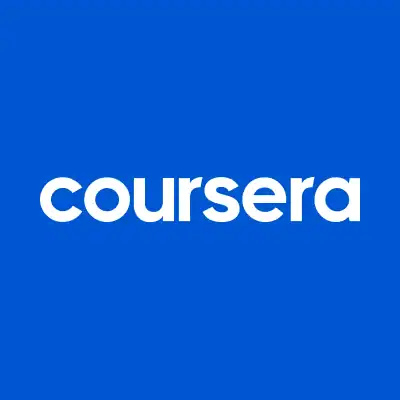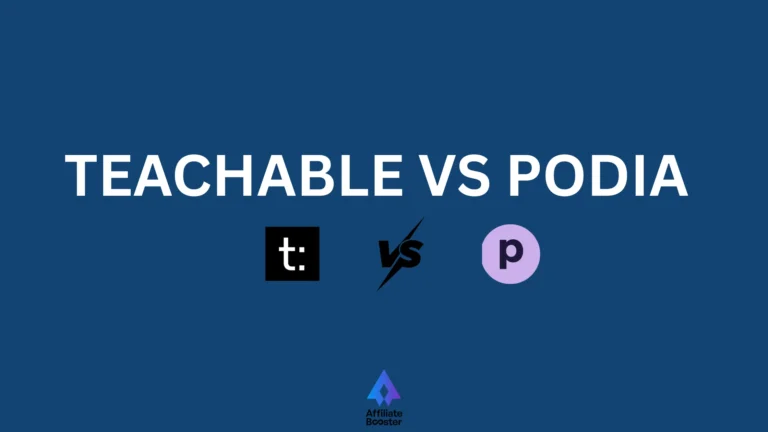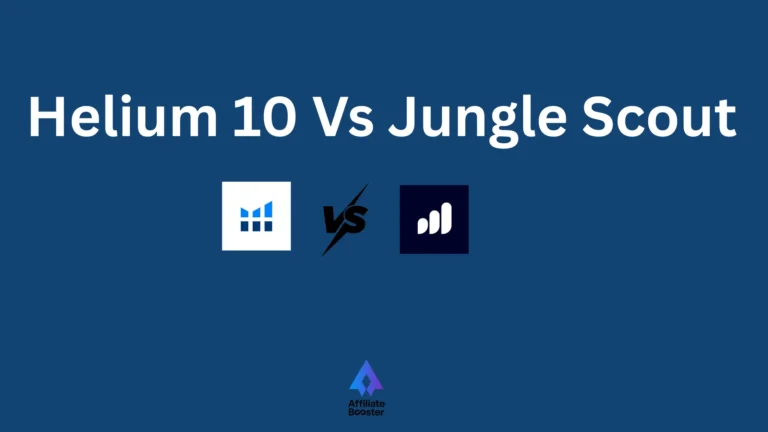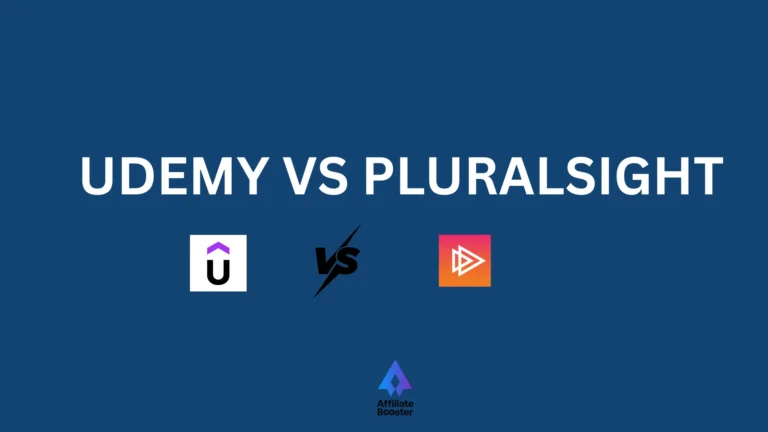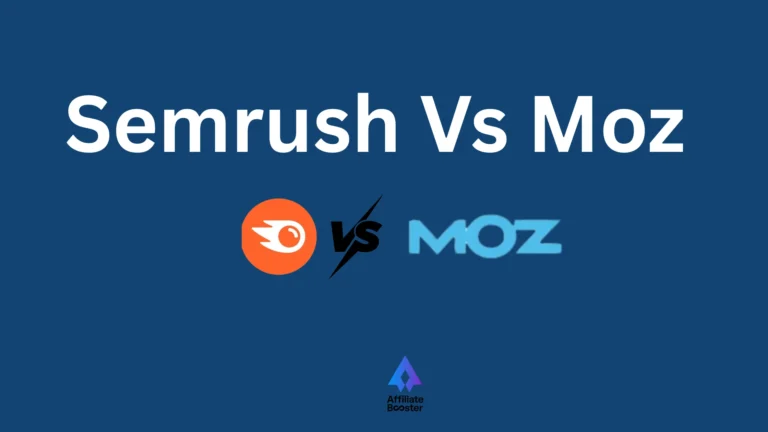Best For | Hands-on, interactive learning for data science beginners. | In-depth, structured learning with certifications from top universities. |
Price | Free (with paid certificates starting at $39/month) | |
Features | -Access to full content library | -University-backed courses |
Pros | -Affordable | -High-quality content |
Cons | -Limited to data science | -More expensive |
If you want to improve your skills in data science, programming, or tech, you’ve probably heard of DataCamp and Coursera.
Both are well-known online learning platforms, but they offer different types of learning experiences.
I’ve spent a lot of time exploring both, and in this post, I’ll explain what each platform offers, its strengths and weaknesses, and which one might be the best fit for you. Let’s see its ultimate comparison.
DataCamp vs. Coursera: Which Learning Platform Fits Your Goals?
Quick Key Takeaways:
- DataCamp specializes in data science skills like Python, R, and SQL with interactive coding exercises and quick feedback.
- Coursera offers a wide range of courses, including data science and humanities, with university-backed certificates and a lecture-based approach.
- DataCamp costs around $25 per month for all courses, while Coursera charges $39-$79 per course or $59 per month for Coursera Plus.
- Choose DataCamp for practical data skills and an easy-to-use interface, or Coursera for recognized certificates, a variety of subjects, and degree options.
- Both platforms have strong communities, but DataCamp’s is data-focused, while Coursera’s is larger and more varied.
Overview of DataCamp
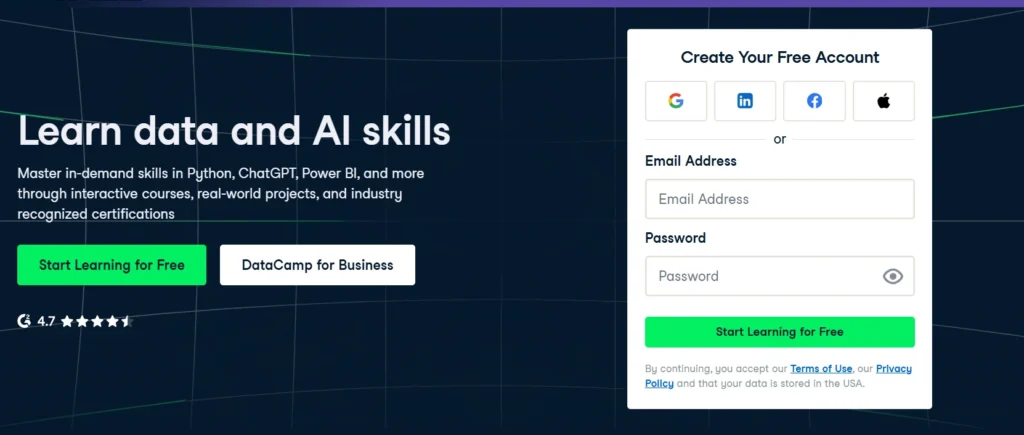
DataCamp, founded in 2013, is an online learning platform focused on data science and analytics. It offers more than 500 courses in Python, R, SQL, and AI, emphasizing hands-on coding through interactive exercises and real-world projects.
With over 13 million users, DataCamp targets learners aiming to build skills for roles such as data analyst or machine learning engineer.
Its subscription-based model gives access to specialized skills and career tracks, providing a focused approach for professionals seeking practical, job-ready data science skills.
Overview of Coursera

Coursera, launched in 2012, is a global online learning platform with more than 7,000 courses in areas such as data science, business, computer science, and humanities.
It partners with top universities like Stanford and Yale, as well as companies like Google and IBM, serving 124 million users with courses, professional certificates, and degree programs.
Coursera’s academic structure includes video lectures, quizzes, and peer-reviewed assignments, catering to learners pursuing a broad education or formal credentials.
Its flexible pricing options, such as Coursera Plus and financial aid, support various career and educational goals.
To Get a Discount on Coursera Plus, check out👉: Coursera Plus Discount: 40% Off + Free Trial
Datacamp Vs Coursera Ultimate Features Comparison
| Features | DataCamp | Coursera |
|---|---|---|
| Course Focus | Data science only (Python, R, SQL, AI) | Wide range (data science, business, humanities, degrees) |
| Learning Style | Hands-on coding, instant feedback | Lectures, quizzes, peer projects |
| Instructors | Industry pros with real-world experience | University professors, industry experts |
| Certificates | Tech-recognized, not accredited | University-backed, often accredited |
| Pricing | ~$25/month for all courses | $39-$79/course or $59/month for Coursera Plus |
| Ease of Use | Simple, coding-focused, mobile-friendly | Structured, slightly complex, mobile app |
| Community | Data-focused forums, Slack | Large, diverse forums, peer interaction |
| Unique Features | Instant code checks, DataLab sandbox | Lab Sandbox, badges, MasterTrack/degrees |
Let's Compare Each Feature in Detail:
Course Offerings
DataCamp:
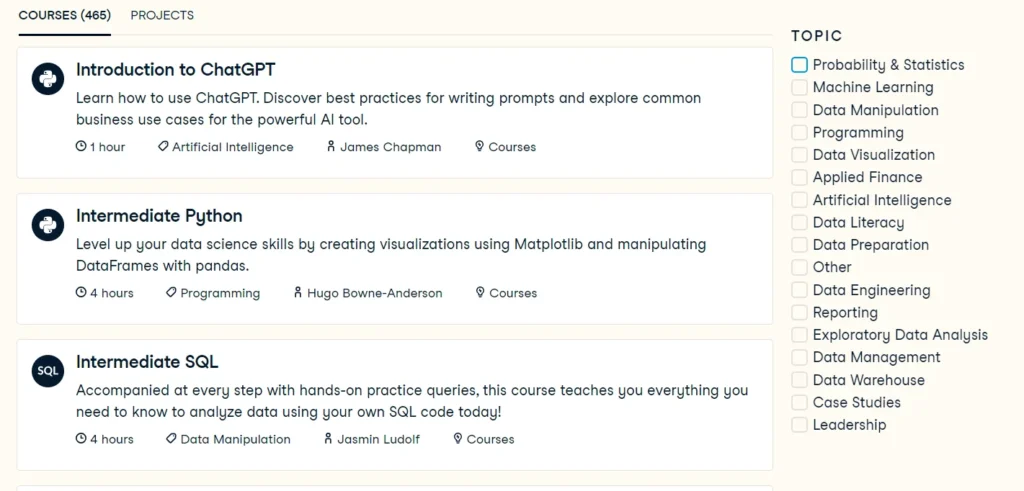
The platform specializes in data science, programming, and analytics. It offers a large library of over 500 courses, with a focus on Python, R, SQL, machine learning, and data visualization.
DataCamp is a great choice if you want to learn specific skills in data science or analytics, and it provides a structured path for mastering these topics step by step.
Coursera:
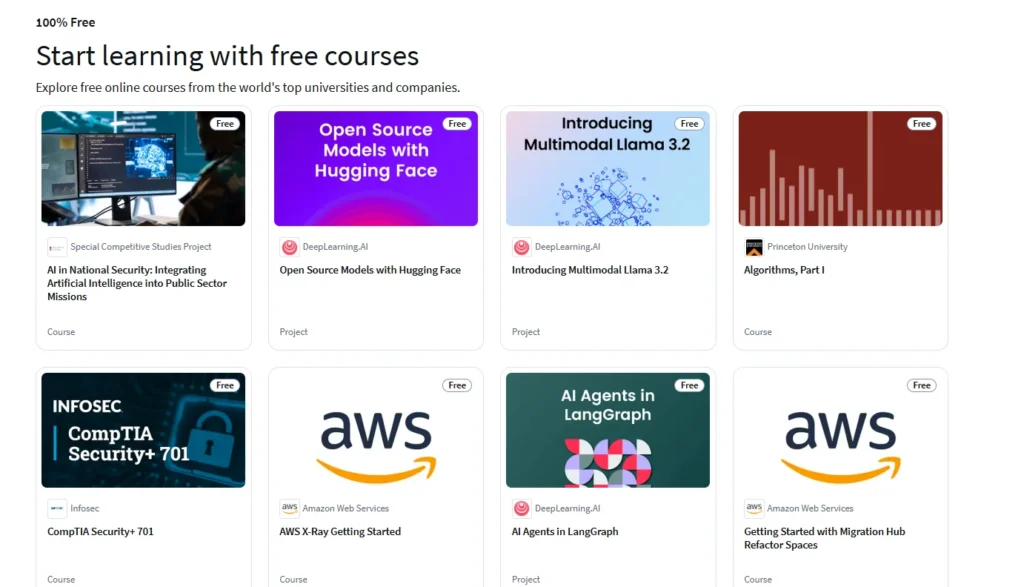
Coursera offers a much broader range of courses across numerous fields. It provides over 7,000 courses covering not just data science, but also business, computer science, arts, humanities, and more.
Coursera’s diverse offerings make it ideal for learners who want to explore multiple disciplines or go beyond just one area of study.
Learning Approach
DataCamp:
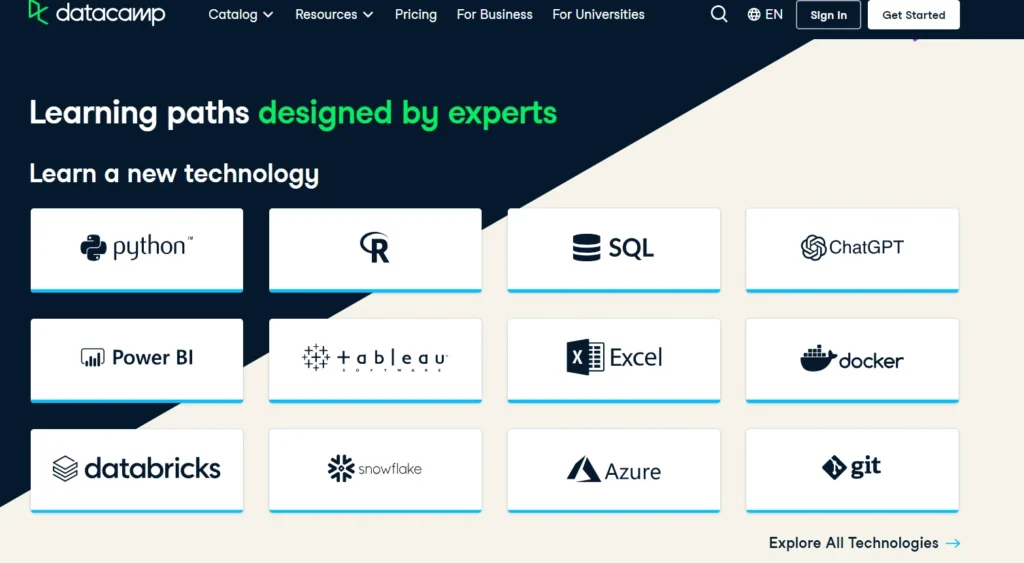
The learning style on DataCamp is very interactive and hands-on. Most of the courses focus on learning by doing, and you’ll spend a lot of time solving coding challenges and working through real-world projects.
The platform allows you to write and test your code directly in the browser, giving you immediate feedback. This practical approach helps reinforce learning through practice.
Coursera:
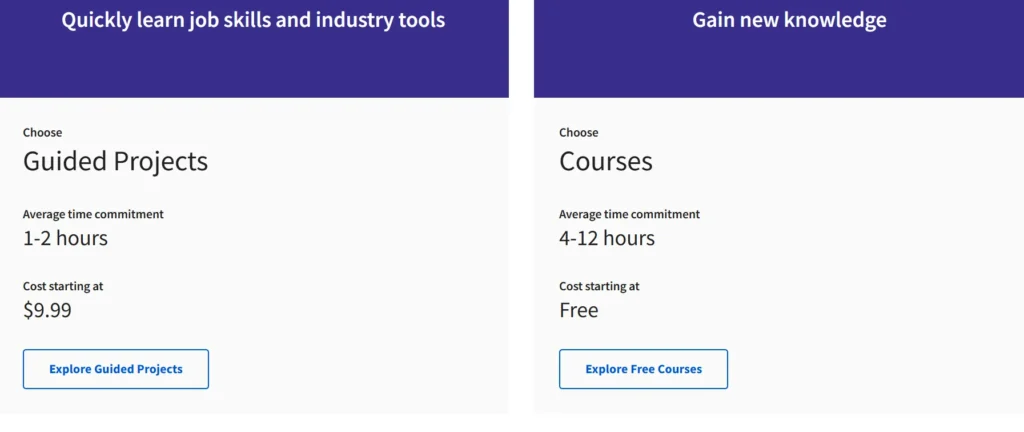
Coursera’s learning approach is more traditional and academic. Courses generally consist of video lectures, reading materials, and quizzes. Some courses include hands-on assignments, but these tend to be less interactive compared to DataCamp.
Coursera offers a more structured learning experience, with a focus on theoretical knowledge in addition to practical application.
Course Length and Flexibility
DataCamp:
Most courses on DataCamp are short, typically ranging from 1 to 4 hours. This makes it easier to fit learning into a busy schedule, and you can take smaller, focused courses that help you build specific skills.
The platform is great for learners who prefer quick, bite-sized lessons without a large time commitment.
Coursera:
Courses on Coursera vary greatly in length. While some are short and can be completed in a few hours, others, particularly professional certificates and degree programs, may take weeks or even months to complete.
Coursera offers a higher level of flexibility when it comes to pacing, as you can work through the content at your own speed, but some courses or programs require a longer commitment than those on DataCamp.
Certifications and Credentials
DataCamp:
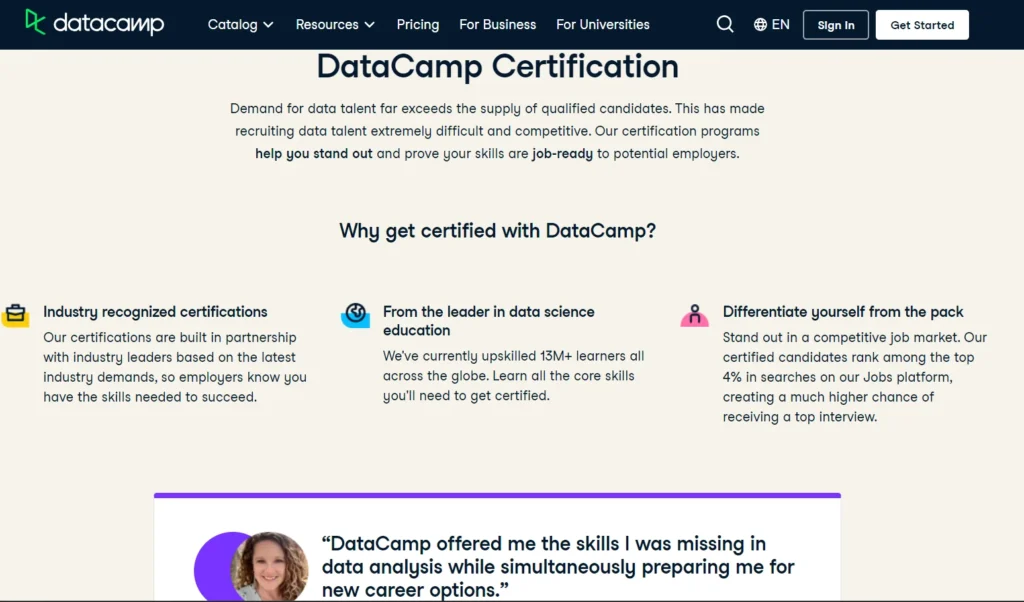
Upon completing a course on DataCamp, you receive a certificate of completion. These certificates are valuable for tracking your learning progress and showcasing the skills you've gained.
However, they are not as widely recognized or formal as the certificates you might earn from traditional universities or more comprehensive platforms.
Coursera:
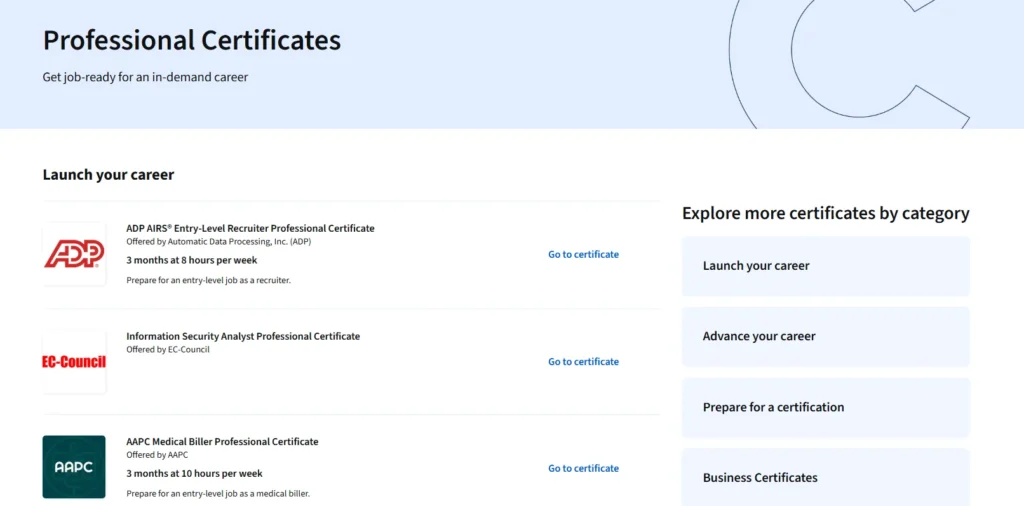
Coursera stands out in terms of certifications. It offers professional certificates, specializations, and full degree programs in partnership with well-known universities like Stanford, Yale, and companies like Google and IBM.
These credentials are widely recognized and carry more weight in the job market. If you’re looking to gain formal qualifications or a degree, Coursera provides a more academic route to achieve that.
Target Audience
DataCamp:
DataCamp is primarily designed for people looking to learn specific data science and programming skills.
Whether you are just starting or looking to level up your knowledge, DataCamp helps you gain practical, hands-on experience in coding and data analysis. If your main goal is to develop job-ready skills in data science, this platform is a perfect fit.
Coursera:
Coursera is ideal for learners who want a more well-rounded education. It caters to individuals looking for professional certificates, degree programs, or a broader understanding of various fields.
Coursera is suitable for those who are not just looking to develop technical skills but also aiming for formal qualifications or an academic approach to learning.
Community and Support
DataCamp:
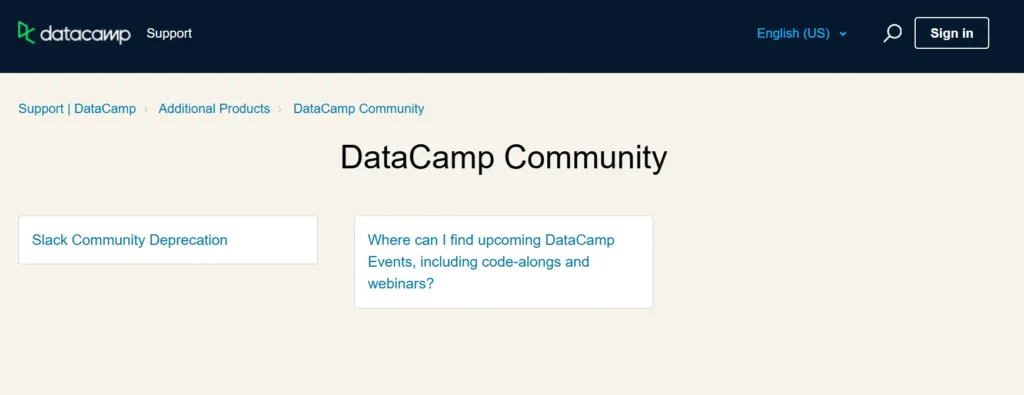
DataCamp has a strong community focused mainly on data science topics. There are discussion forums where learners can interact, ask questions, and help each other out.
The platform also has a variety of challenges and practice sessions to keep learners engaged. Support is available, but it mainly covers technical aspects related to the platform and coding exercises.
Coursera:

Coursera has a larger and more diverse community since it covers a wide range of topics. The platform includes discussion forums and peer-reviewed assignments, which can encourage collaboration and interaction with other learners.
Coursera also provides support in the form of student services for degree programs, making it a more formal learning environment.
Datacamp Vs Coursera Pricing Plans Overview
DataCamp Pricing

- Structure: DataCamp operates on a subscription-based model.
- Cost: The Premium plan is priced at approximately $25 per month or $300 per year, providing access to all 500+ courses, projects, and certificates.
- Free Option: Limited access to the first chapters of some courses and a selection of free projects is available, allowing you to explore the platform before committing.
- Extras: Students enjoy a 50% discount, and teachers receive a free 6-month subscription. Team plans are also offered for businesses.
- Overview: DataCamp offers a straightforward and cost-effective pricing structure, providing comprehensive access to data science courses and resources.
Coursera Pricing

- Structure: Coursera combines pay-per-course, subscription plans, and degree programs, offering a range of pricing options.
- Cost: Individual courses generally cost between $39 and $79, including the course certificate. The Coursera Plus plan, priced at $59 per month or around $399 per year, provides access to most courses and certificates. Degree programs can cost several thousand dollars.
- Free Option: Many courses can be audited for free, though you will not receive a certificate or have access to graded assignments. Financial aid is available for eligible learners.
- Extras: Professional Certificates, such as Google’s Data Analytics program, typically cost $49 per month until completion. Guided Projects are available starting at $9.99.
- Overview: Coursera offers a flexible pricing model, though it can be more costly, particularly for premium options like degree programs or enrolling in multiple courses.
Customer Support Comparison
DataCamp Support
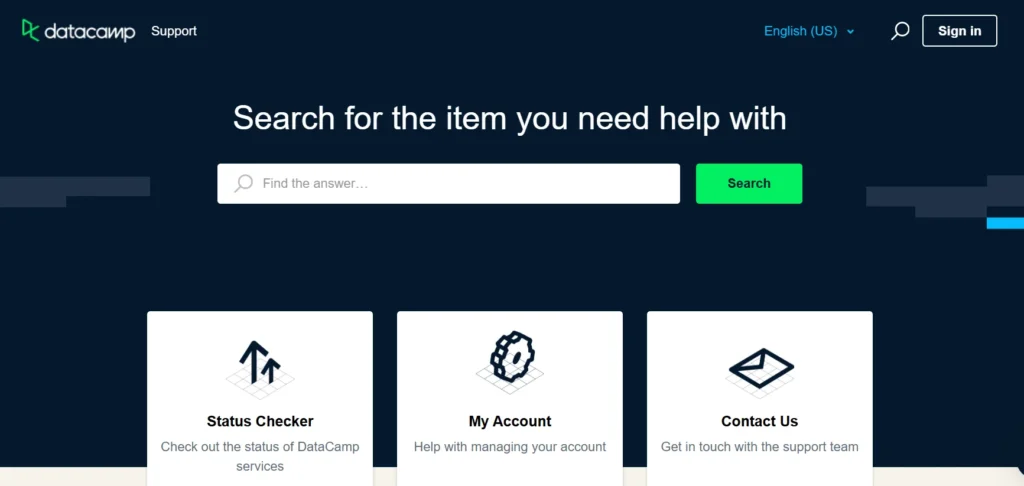
DataCamp provides support through a help center, email, live chat for paid users, community forums, and Slack channels.
There’s no phone support. Responses usually come within 1-3 days, resolving issues like coding errors or account access. Although some billing disputes may take longer to resolve, live chat typically resolves them quickly.
The community forums and Slack channels provide a collaborative space for learners to solve problems, particularly for premium users.
Coursera Support

Coursera offers support through a help center, email, live chat for paid users, forums, and in-course question flagging. It also features Coursera Coach, an AI tutor for real-time help.
Email responses usually take 1-2 days, and the forums provide support for lesson-specific questions.
The AI tutor provides instant explanations, while global forums enable learners from diverse backgrounds to collaborate.
Datacamp Vs Coursera: Pros & Cons
Datacamp
Pros
- Focuses on data science with over 500 courses in Python, R, SQL, and AI.
- Hands-on coding with immediate feedback, all within your browser, no setup required.
- Affordable at around $25 per month, with discounts for students.
- Real-world projects help you gain job-ready skills for data roles.
- Simple, gamified design makes learning fun and keeps you engaged.
Cons
- Limited to data science; no courses for other fields.
- Certificates are not accredited and may not carry much weight for academic careers.
- No phone support, only email, chat, or forums for help.
- Some users report difficulty with billing issues.
Coursera
Pros
- Offers over 7,000 courses in data science, business, humanities, and degrees.
- University-backed certificates from top schools like Stanford and Yale add prestige.
- Flexible pricing options audit courses for free, or pay $39-$79 per course, or $59/month for Coursera Plus.
- AI-powered Coursera Coach and forums provide strong support.
- Degree programs and professional certificates open up many career options.
Cons
- Costs can add up, especially for multiple courses or degree programs.
- The academic approach can feel more focused on theory than hands-on practice.
- Peer-graded assignments may face delays if reviews take time.
- Some beginners find the platform’s navigation a bit difficult.
Who Should Choose DataCamp and Who Should Choose Coursera?
Who Should Go for DataCamp?
- Data Science Enthusiasts: If you’re focused on learning Python, R, SQL, or AI, DataCamp offers 500+ courses tailored to those topics.
- Hands-On Learners: If you prefer learning by doing, DataCamp’s coding exercises and real-world projects are ideal.
- Beginners or Professionals in Data Roles: Whether you’re new to data or want to sharpen your skills for roles like Data Analyst or Machine Learning Engineer, DataCamp helps build job-ready skills.
- Budget-Conscious Learners: At around $25 per month for full access, it’s a cost-effective option.
- Tech-Focused Learners: If you want a simple, gamified platform that helps you master data tools without distractions, DataCamp is a great choice.
Who Should Go for Coursera?
- Versatile Learners: If you want to study topics like data science, business, psychology, or even earn a degree, Coursera offers over 7,000 courses.
- Academic Achievers: If you need prestigious certificates from top universities like Stanford or Yale, or want accredited credentials, Coursera is the right platform.
- Career Changers: If you want to switch careers into tech, finance, or leadership, Coursera’s professional certificates and degrees can help you transition.
- Theory-Oriented Learners: If you prefer structured lessons and in-depth concepts, Coursera’s university-style courses are a good fit.
- Community Seekers: If you enjoy collaborating in large, global forums, Coursera’s active community (124 million users) will offer plenty of opportunities.
From my eyes👀:
I would choose DataCamp if I wanted to focus on coding and data science, like when I needed Python skills for a project. For broader learning or a recognized credential, I’d go with Coursera.
DataCamp is for those focused on diving deep into data, while Coursera is for those who want a wider range of learning or a respected qualification.
Frequently Asked Questions
❓Are DataCamp certificates worth it?
Yes, for tech jobs, DataCamp certificates show practical skills in Python or SQL, recognized by companies like Google. They’re not accredited, so less weight for academic paths.
❓Who teaches on DataCamp and Coursera?
DataCamp has industry pros like data scientists. Coursera features university professors from places like Stanford and experts from Google or IBM.
❓Can I get a degree on DataCamp or Coursera?
DataCamp doesn’t offer degrees, just courses and certificates. Coursera has full Bachelor’s and Master’s degrees from top universities, plus professional certificates.
❓Which platform helps me land a data science job faster?
DataCamp’s hands-on coding and real-world projects get you job-ready for data analyst or machine learning roles quickly. Coursera’s professional certificates, like Google’s Data Analytics, take longer but add prestige that employers love.
Also, take a look at:
- Teachable Vs Podia: Which Is Better for Your Online Course?
- Udemy vs Pluralsight: Which Is Best for Career Growth?
- Helium 10 Vs Jungle Scout: Which Helps FBA Sellers Most?
- Kajabi Vs Thinkific: Which Platform Is Best To Create Courses?
Wrapping up:
In conclusion, if you’re looking for focused, hands-on data science skills in areas like Python, R, SQL, and AI, DataCamp is the ideal choice.
It offers affordable pricing and a practical, coding-driven approach. On the other hand, if you need a wider selection of courses, university-backed certificates, or degrees for diverse career opportunities, Coursera is the better option.
Both platforms offer great value, so it depends on your specific learning goals and career path. Choose the one that best aligns with your needs.
